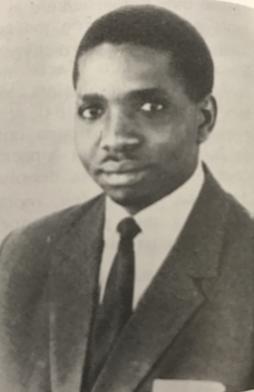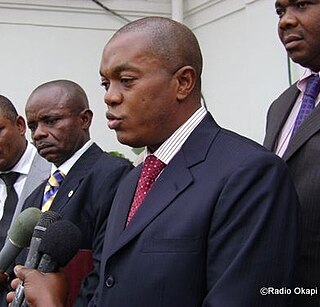
The Democratic Republic of the Congo, also known as Congo-Kinshasa, Congo-Zaire, Congo DR, DR Congo, DRC, or simply either Congo or the Congo, is a country in Central Africa. By land area, the DRC is the second-largest country in Africa and the 11th-largest in the world. With a population of around 105 million, the Democratic Republic of the Congo is the most populous Francophone country. The national capital and largest city is Kinshasa, which is also the economic center. The country is bordered by the Republic of the Congo, Central African Republic, South Sudan, Uganda, Rwanda, Burundi, Tanzania, Zambia, Angola, the Cabinda exclave of Angola, and the South Atlantic Ocean.

The president of the Democratic Republic of the Congo is the head of state of the Democratic Republic of the Congo and commander-in-chief of the armed forces.

The Third Republic of the Democratic Republic of the Congo is a unitary state with a five-level hierarchy of types of administrative division. There are nine different types of country subdivision in a new hierarchy with no new types but with two from the previous one abolished.
The Movement for the Liberation of the Congo is a political party in Democratic Republic of the Congo. Formerly a rebel group operating in the Democratic Republic of Congo that fought the government throughout the Second Congo War, it subsequently took part in the transitional government and is one of the main opposition parties.

The Senate is the upper house of the Parliament of the Democratic Republic of the Congo. The senate was established in 1960, abolished in 1967 and re-established in 2003.

The Prime Minister of the Democratic Republic of the Congo is the head of government of the Democratic Republic of the Congo. The Constitution of the Third Republic grants the Prime Minister a significant amount of power.

Vital Kamerhe Lwa Kanyiginyi Nkingi is a Congolese politician, currently serving as Deputy Prime Minister of Economy and the leader of the Union for the Congolese Nation (UNC) party. He served as the President of the National Assembly of the Democratic Republic of the Congo from 2006 to 2009. After resigning from that office, he went into the opposition and founded the UNC. He ran in the 2011 presidential election. He supported Félix Tshisekedi as a coalition partner in the 2018 presidential election, and became chief of staff when Tshisekedi took office.

The Government of the Democratic Republic of the Congo is the second institution in the central executive branch of the Democratic Republic of the Congo, the first institution being the President, who has the title of head of state.

Senate elections were held in the Democratic Republic of the Congo on 14 March 2019 to elect the 108 Senators. Former DRC President Joseph Kabila, who stepped down from office in January 2019 following the inauguration of the recently elected Félix Tshisekedi, has also joined the upper house of the legislature as a senator for life, for a total of 109 seats.

The People's Palace or Palace of the People is the seat of the National Assembly and the Senate in Kinshasa, Democratic Republic of Congo, formerly Zaire. It was completed in 1979 with a line of credit from the People's Republic of China. It has witnessed key moments in the country's political landscape, bearing witness to historic debates, legislative triumphs, and the exercise of democratic values. The building serves as a gathering place for lawmakers and a venue for official ceremonies.

Samy Badibanga Ntita is a Congolese politician who was Prime Minister of the Democratic Republic of the Congo from November 2016 to May 2017. He was also on the ballot for the 2018 Democratic Republic of the Congo general election as a presidential candidate.

Joseph Midiburo was a Congolese politician who served as the third President of the Chamber of Deputies of the Democratic Republic of the Congo.
Bertin Mwamba or Mwamba Maleba Banze Kabombo is a Congolese politician who served as the third President of the Chamber of Deputies of the Democratic Republic of the Congo.

Félix Antoine Tshisekedi Tshilombo is a Congolese politician who has been the President of the Democratic Republic of the Congo since 24 January 2019. He is the leader of the Union for Democracy and Social Progress (UDPS), the DRC's oldest and largest party, succeeding his late father Étienne Tshisekedi in that role, a three-time Prime Minister of Zaire and opposition leader during the reign of Mobutu Sese Seko. Tshisekedi was the UDPS party's candidate for president in the December 2018 general election, which he was awarded, despite accusations of irregularities from several election monitoring organisations and other opposition parties. The Constitutional Court of the DRC upheld his victory after another opposition politician, Martin Fayulu, challenged the result, but Tshisekedi has been accused of making a deal with his predecessor, Joseph Kabila. The election marked the first peaceful transition of power since the state became independent from Belgium in 1960.
Jeanine Mabunda Lioko Mudiayi is a Congolese lawyer and politician who in 2019 became the first woman elected to lead the Democratic Republic of the Congo's National Assembly. She was impeached on December 10, 2020, through a democratic vote by the National Assembly with 281 votes.

Jean-Michel Sama Lukonde Kyenge is a Congolese politician from the former Katanga Province who has served as Prime Minister of the Democratic Republic of the Congo from 2021, and acting prime minister since 20 February 2024 until a new government is formed and is approved by the National Assembly. He announced his first cabinet on 12 April 2021. He is a member of the Future of Congo party.
Aminata Namasia Bazego is a politician and member of the Democratic Republic of the Congo Parliament, appointed Deputy Minister of Primary, Secondary and Technical Education since April 2021.

General elections were held in the Democratic Republic of the Congo on 20 December 2023. Combined elections were held for the President, 484 of the 500 members of the National Assembly, 700 of the 716 elected members of the 26 provincial assemblies, and for the first time under the new constitution, 951 members of a scaled down number of commune (municipal) councils. On election day, the Congolese government extended voting to 21 December for polling stations that had not opened on 20 December. Agence France-Presse reported that some polling stations would open as late as 24 December.

Jean-Claude Baende is a politician in the Democratic Republic of the Congo. He is a national deputy who represented represented Mbandaka in the National Assembly in 2011, and served as governor of Équateur Province from 2009 to 2013. Baende unsuccessfully ran for president during the 2023 Democratic Republic of the Congo general election.













